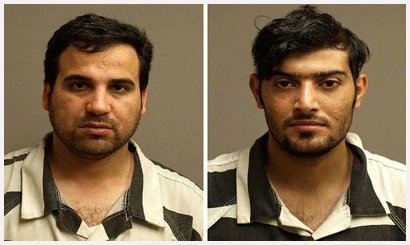Tag: ISIS
Germans Take To The Streets To Protest Leftist Policies Allowing Muslim Migrants Into Their Nation
FED UP! Germans Have Begun Taking to the Streets to Protest Leftist Policies Allowing Muslim Migrants into the Nation.
Germans are fed up just like the Italians and the rest of Europe at the rate of Muslim immigration into their nations.
Watch as Germans take to the streets to protest the Muslim migrants Angela Merkel and her leftists government continue to bring into Germany.
Congresswoman Exposes Damning Truth After Visit To Syria: “There Are No Moderate Rebels”
Congresswoman Tulsi Gabbard didn’t hold anything back in her interview on CNN.
Congresswoman Tulsi Gabbard, a Democratic Representative from Hawaii, recently visited Syria in secret for four days and returned to the U.S. with a message based on what she saw. She appeared on CNN to speak with Jake Tapper on Wednesday and essentially brief him on what Syrian people told her and also to discuss her impromptu meeting with Syria’s President Assad. In the interview, Gabbard said,
“[The Syrian people] expressed happiness and joy at seeing an American walking through their streets. But they also asked why the U.S. and its allies are providing support and arms to terrorist groups like al-Nusra, al-Qaida or al-Sham, ISIS who are on the ground there, raping, kidnapping, torturing and killing the Syrian people.”
For several years, Obama’s Administration has been touting their financial and armaments backing of ‘moderate rebels,’ who are supposed to be rebel forces that are not as bad or inhumane as al-Qaida, ISIS, and the like. Though the idea that moderate rebels exists has been essentially debunked by video footage of these rebels beheading people and blowing up evacuation buses for humanitarians, there have been no U.S. officials that have visited the area since the war broke out to discuss these groups. That’s what makes Gabbard’s visit so unique and important.
Gabbard said that the plight of Syrian people and their country has weighed on her heart for several years and that this is what prompted her to make a secret trek to the suffering nation. The U.S. has been backing these so-called ‘moderate rebels’ for years as a way to show support for overthrowing Assad as president, but many of the provided weapons have made their way to extreme groups, like ISIS. Gabbard said of her discussions with citizens,
“They asked me, why is the United States and its allies supporting these terrorist groups who are destroying Syria when it was al Qaida who attacked the United States on 9/11, not Syria. I didn’t have an answer for them…. There is a number of different, other groups — all of them essentially are fighting alongside, with, or under the command of the strongest group on the ground that’s trying to overthrow Assad.”
According to Gabbard, what’s most frightening to the Syrian people is the rebels winning the war and taking over the government, only to wreak more havoc with continuous assaults against citizens. Though Gabbard recognized that President Assad has done horrible things, such as using chemical weapons against his own citizens in an effort to put out the fires of their protesting and hostility, she acknowledged that his power means it’s necessary to open up a dialogue with him. As Tapper pointed out, Assad has killed hundreds of thousands of his own people rather than listening to their wants and needs and is, in the end, responsible for the breakout of the civil war and the fleeing of his people. Gabbard responded by saying,
“Whatever you think about President Assad, the fact is that he is the president of Syria,” Tulsi replied. “In order for any peace agreement, in order for any possibility of a viable peace agreement to occur, there has to be a conversation with him,” she said. “The Syrian people will determine his outcome and what happens with their government and their future, but our focus, my focus, my commitment is on ending this war that has caused so much suffering to the Syrian people.”
What she means is that it’s unfair for the U.S. to intervene and take the side of the people that all of the civilians are against. In the end, it’s the Syrians that will decide theirs and Assad’s fate when the civil war is over and that an agreement can be reached after the war has come to a stop, not during. Though her opinion may be unpopular, they are based on her very real experiences with Syrian civilians, who are extremely confused at the term ‘moderate rebels’ and affirm that “there are no moderate rebels.”
The war is far from over, but a new administration could mean an entirely different approach to the war for the U.S. This could mean siding with Russia and Iran by backing President Assad’s attack on the rebels or it could, however unlikely it may be, mean pulling support for either side of the war whatsoever.
Watch the full interview below.
Previously:
What’s Really Going On In Syria? Are We Being Lied To?
Leaked John Kerry Audio Reveals Obama Intentionally Allowed The Rise Of ISIS
Syrians in Aleppo Chanting: “Clinton, you cow, leave us alone”
FLASHBACK: Al Qaeda In Kentucky
US May Have Let ‘Dozens’ Of Terrorists Into Country As Refugees (2013)

Remember when Liberals questioned the Refugee screening process? Terrorism Case Exposes Gaps In Refugee Screening
Several dozen suspected terrorist bombmakers, including some believed to have targeted American troops, may have mistakenly been allowed to move to the United States as war refugees, according to FBI agents investigating the remnants of roadside bombs recovered from Iraq and Afghanistan.
The discovery in 2009 of two al Qaeda-Iraq terrorists living as refugees in Bowling Green, Kentucky — who later admitted in court that they’d attacked U.S. soldiers in Iraq — prompted the bureau to assign hundreds of specialists to an around-the-clock effort aimed at checking its archive of 100,000 improvised explosive devices collected in the war zones, known as IEDs, for other suspected terrorists’ fingerprints.
“We are currently supporting dozens of current counter-terrorism investigations like that,” FBI Agent Gregory Carl, director of the Terrorist Explosive Device Analytical Center (TEDAC), said in an ABC News interview to be broadcast tonight on ABC News’ “World News with Diane Sawyer” and “Nightline”.
“I wouldn’t be surprised if there were many more than that,” said House Committee on Homeland Security Chairman Michael McCaul. “And these are trained terrorists in the art of bombmaking that are inside the United States; and quite frankly, from a homeland security perspective, that really concerns me.”
As a result of the Kentucky case, the State Department stopped processing Iraq refugees for six months in 2011, federal officials told ABC News – even for many who had heroically helped U.S. forces as interpreters and intelligence assets. One Iraqi who had aided American troops was assassinated before his refugee application could be processed, because of the immigration delays, two U.S. officials said. In 2011, fewer than 10,000 Iraqis were resettled as refugees in the U.S., half the number from the year before, State Department statistics show.
Suspect in Kentucky Discovered to Have Insurgent Past
An intelligence tip initially led the FBI to Waad Ramadan Alwan, 32, in 2009. The Iraqi had claimed to be a refugee who faced persecution back home — a story that shattered when the FBI found his fingerprints on a cordless phone base that U.S. soldiers dug up in a gravel pile south of Bayji, Iraq on Sept. 1, 2005. The phone base had been wired to unexploded bombs buried in a nearby road.
An ABC News investigation of the flawed U.S. refugee screening system, which was overhauled two years ago, showed that Alwan was mistakenly allowed into the U.S. and resettled in the leafy southern town of Bowling Green, Kentucky, a city of 60,000 which is home to Western Kentucky University and near the Army’s Fort Knox and Fort Campbell. Alwan and another Iraqi refugee, Mohanad Shareef Hammadi, 26, were resettled in Bowling Green even though both had been detained during the war by Iraqi authorities, according to federal prosecutors.
Most of the more than 70,000 Iraqi war refugees in the U.S. are law-abiding immigrants eager to start a new life in America, state and federal officials say.
But the FBI discovered that Alwan had been arrested in Kirkuk, Iraq, in 2006 and confessed on video made of his interrogation then that he was an insurgent, according to the U.S. military and FBI, which obtained the tape a year into their Kentucky probe. In 2007, Alwan went through a border crossing to Syria and his fingerprints were entered into a biometric database maintained by U.S. military intelligence in Iraq, a Directorate of National Intelligence official said. Another U.S. official insisted that fingerprints of Iraqis were routinely collected and that Alwan’s fingerprint file was not associated with the insurgency.
“How do they get into our community?”
In 2009 Alwan applied as a refugee and was allowed to move to Bowling Green, where he quit a job he briefly held and moved into public housing on Gordon Ave., across the street from a school bus stop, and collected public assistance payouts, federal officials told ABC News.
“How do you have somebody that we now know was a known actor in terrorism overseas, how does that person get into the United States? How do they get into our community?” wondered Bowling Green Police Chief Doug Hawkins, whose department assisted the FBI.
Department of Homeland Security spokesperson Peter Boogaard said in a statement that the U.S. government “continually improves and expands its procedures for vetting immigrants, refugees and visa applicants, and today [the] vetting process considers a far broader range of information than it did in past years.”
“Our procedures continue to check applicants’ names and fingerprints against records of individuals known to be security threats, including the terrorist watchlist, or of law enforcement concern… These checks are vital to advancing the U.S. government’s twin goal of protecting the world’s most vulnerable persons while ensuring U.S. national security and public safety,” the statement said.
Last year, a Department of Homeland Security senior intelligence official testified in a House hearing that Alwan and Hammadi’s names and fingerprints were checked by the FBI, DHS and the Defense Department during the vetting process in 2009 and “came in clean.”
After the FBI received the intelligence tip later that year, a sting operation in Kentucky was mounted to bait Alwan with a scheme hatched by an undercover operative recruited by the FBI, who offered Alwan the opportunity to ship heavy arms to al Qaeda in Iraq. The FBI wanted to know if Alwan was part of a local terror cell — a fear that grew when he tapped a relative also living in Bowling Green, Hammadi, to help out.
The FBI secretly taped Alwan bragging to the informant that he’d built a dozen or more bombs in Iraq and used a sniper rifle to kill American soldiers in the Bayji area north of Baghdad.
“He said that he had them ‘for lunch and dinner,'” recalled FBI Louisville Supervisory Special Agent Tim Beam, “meaning that he had killed them.”
Alwan even sketched out IED designs, which the FBI provided to ABC News, that U.S. bomb experts had quickly determined clearly demonstrated his expertise.
‘Needle in a Haystack’ Fingerprint Match Found on Iraq Bomb Parts, White House Briefed
The case drew attention at the highest levels of government, FBI officials told ABC News, when TEDAC forensic investigators tasked with finding IEDs from Bayji dating back to 2005 pulled 170 case boxes and, incredibly, found several of Alwan’s fingerprints on a Senao-brand remote cordless base station. A U.S. military Significant Action report on Sept. 1, 2005 said the remote-controlled trigger had been attached to “three homemade-explosive artillery rounds concealed by gravel with protruding wires.”
“There were two fingerprints, developed on the top of the base station,” Katie Suchma, an FBI supervisory physical scientist at TEDAC who helped locate the evidence, told ABC News at the center’s IED examination lab. “The whole team was ecstatic because it was like finding a needle in a haystack.”
“This was the type of bomb he’s talking about when he drew those pictures,” added FBI electronics expert Stephen Mallow.
Word was sent back to the FBI in Louisville.
“It was a surreal moment, it was a real game changer, so to speak, for the case,” FBI agent Beam told ABC News. “Now you have solidified proof that he was involved in actual attacks against U.S. soldiers.”
Worse, prosecutors later revealed at Hammadi’s sentencing hearing that he and Alwan had been caught on an FBI surveillance tape talking about using a bomb to assassinate an Army captain they’d known in Bayji, who was now back home – and to possibly attack other homeland targets.
“Many things should take place and it should be huge,” Hammadi told Alwan in an FBI-recorded conversation, which a prosecutor read at Hammadi’s sentencing last year.
Then-FBI Director Robert Mueller briefed President Obama in early 2011 as agents and Louisville federal prosecutors weighed whether to arrest Alwan and Hammadi or continue arranging phony arms shipments to Iraq that the pair could assist with, consisting of machine guns, explosives and even Stinger missiles the FBI had secretly rendered inoperable and which never left the U.S.
But agents soon determined there were no other co-conspirators. An FBI SWAT team collared the terrorists in a truck south of Bowling Green in late May 2011, only weeks after al Qaeda founder Osama bin Laden was killed in Pakistan and Obama had visited nearby Fort Campbell to thank the SEALs and Army Nightstalker pilots for their successful mission. The Kentucky al Qaeda case drew little attention as the nation celebrated Bin Laden’s death.
Suspects Linked to Attack That Killed 4 US Soldiers
Pennsylvania National Guard soldiers who had served in Bayji in 2005 saw news reports about the two arrests, and Army Staff Sgt. Joshua Hedetniemi called the FBI to alert them to an Aug. 9, 2005, IED attack that killed four of their troopers in a humvee patrolling south of the town. The U.S. attorney’s office in Louisville eventually placed the surviving soldiers in its victim notification system for the case, even though it couldn’t be conclusively proven that Alwan and Hammadi had killed the Guardsmen.
The four Pennsylvania soldiers killed that day were Pfc. Nathaniel DeTample, 19, Spec. Gennaro Pellegrini, 31, Spec. Francis J. Straub Jr., 24, and Spec. John Kulick, 35.
“It was a somber moment for the platoon, we had a great deal of love and respect for those guys and it hit us pretty hard,” Hedetniemi said in an interview in the Guard’s armory near Philadelphia. “I think that these two individuals are innately evil to be able to act as a terrorist and attack and kill American soldiers, then have the balls to come over to the United States and try to do the same exact thing here in our homeland.”
Confronted with all the evidence against them, Alwan and Hammadi agreed to plead guilty to supporting terrorism and admitted their al Qaeda-Iraq past. Alwan cooperated and received 40 years, while Hammadi received a life term which he is appealing. A hearing for Hammadi’s appeal took place Tuesday in the 6th U.S. Circuit Court of Appeals in Ohio.
“We need to take this as a case study and draw the right lessons from it, and not just high-five over this,” said retired Army Lt. Gen. Michael Barbero, who headed the military’s Joint IED Defeat Organization until last May. “How did a person who we detained in Iraq — linked to an IED attack, we had his fingerprints in our government system — how did he walk into America in 2009?”
Barbero is credited with leveraging the Kentucky case to help the FBI get funding to create a new state of the art fingerprint lab focused solely on its IED repository in a huge warehouse outside Washington. The new FBI lab assists counterterrorism investigations of suspected bombmakers and IED emplacers and looks for latent prints on 100,000 IED remnants collected over the past decade by the military and stored in the vast TEDAC warehouse.
The only man in the Humvee to survive the 2005 IED bombing in Bayji, Daniel South, who is now an Army Black Hawk helicopter pilot in Texas, said he was stunned to learn al Qaeda-Iraq insurgents were living in Kentucky — but he’s glad they were finally brought to justice for attacking U.S. troops in Iraq.
“I kind of wish that we had smoked [Alwan] when it happened, but we didn’t have that opportunity so I guess this is second best,” South told ABC News.


